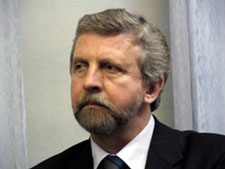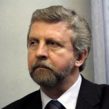
MILINKEVICH FACES NEW TASKS
Publication: Eurasia Daily Monitor Volume: 3 Issue: 216
By:

The leader of the United Democratic Forces of Belarus (UDF), Alyaksandr Milinkevich, has signed an agreement with the Party of the Belarusian Popular Front. According to the leader of the initiative group for the formation of the movement “For Freedom,” Viktar Karnienka, the agreement is intended to dispel rumors of differences between the two sides and to emphasize the common goal of conducting free and democratic elections in Belarus. Milinkevich plans in the near future to sign similar agreements with other political structures, including the Social Democratic “Hramada” led by Stanislau Shushkevich, the unregistered “Party of Freedom and Progress” of Uladzimir Navasyad, the unregistered “Young Front,” and with the supporters of the former leader of the Belarusian Social Democratic Hramada, Mikola Statkevich (Belorusskie novosti, November 20).
The move comes two weeks after the UDF’s executive committee announced the beginning of a door-to-door pre-election information campaign. The objective of the campaign is to encourage people to think about the situation in the country and to come to the correct choice, reported Viktar Ivashkevich, deputy chairman of the BPF. Specifically, the information campaign began by issuing stickers containing brief comments about the political and socioeconomic situation in Belarus. Thirty-two different statements appear on the stickers, such as “Belarus is found in 67th place in the UN rating of socioeconomic development. Our country lags behind Estonia, Poland, Lithuania, Latvia, and Russia” and “According to business climate, Belarus occupies 106th place among 155 countries, [whereas] Kazakhstan is 86th, Russia 79th, Lithuania 15th, and Estonia 16th” (BelGazeta, November 13).
Clearly the intention is to counter official proclamations of economic success under President Alexander Lukashenka, which has been the key electoral platform of the regime in past presidential and parliamentary elections. The UDF has stepped up activities to coincide with the period of campaigning for local elections in Belarus. Leaders are less interested in seeking votes than using the occasion for renewed attempts to counter official propaganda. Altogether 15,846 initiative groups have been registered to be allowed to nominate candidates for local council deputies. Currently they are collecting the requisite signatures. However, the role of political parties in the campaign is meager. The pro-government Communist Party has registered 181 initiative groups, and the figures are almost identical for the opposition parties: Party of the BPF (138); United Civic Party (135); and Party of Communists of Belarus (134) (Belarusy i Rynok, November 20-27).
For UDF leader Milinkevich, the situation is now complex. Despite his impressive, though abortive, campaign in the 2006 presidential election, the UDF is also using the local elections to gather signatures to nominate delegates to a new Convention of Democratic Forces to be held prior to March 25, 2007. Delegates need at least 300 signatures in order to attend the congress, and these will be verified by an “alternative Central Election Commission.” It is evident to both the UDF leader and other analysts that this mode of selecting delegates to a Democratic Convention is slanted in favor of existing political parties to the detriment of non-party activists, as well as those parties that have opted to boycott the local elections, such as the Conservative Christian Party of the Belarusian Popular Front. Milinkevich’s movement “For Freedom” has also been criticized for embracing a fundamentally Western concept that does not hold the same attraction to the Belarusian electorate as it does in EU countries or the United States, and thus appears weaker and less enticing than his former electoral slogan “Freedom, Truth, and Justice” (Kirill Poznyak [Kiril Paznyak] in Belapan, November 2 and November 14).
Analysts wonder why it is necessary to hold a new Convention of Democratic Forces so soon after its predecessor, which elected Milinkevich in the second round over his close rival, Anatol Lyabedzka. Speaking in Warsaw on November 10, Milinkevich stressed the need for the UDF to maintain unity, “a single fist.” He also expressed his concern for the thousands of operatives suffering arrest, harassment, and lost jobs and positions, as well as for student supporters who had been expelled from their institutions. Yet he avoided addressing the critical issue, which is surely the ambition of individual party leaders who question his leadership and insist on a new round of voting that may divide rather than unite the UDF.
The EU has encouraged the Belarusian opposition by awarding Milinkevich its highest honor — the Sakharov Prize for Freedom of Thought — as well as offering a policy paper on what the EU could bring to Belarus if it chose to reform and hold fair elections, establish a free press, release political prisoners, investigate kidnapped and missing persons, allow workers to join non-government trade unions, and create an independent judiciary (Europaworld, November 3; EU Observer, November 20). The EU paper coincides, quite deliberately, with a time of Belarusian tension with Russia over prices for gas in 2007, which could rise from $46.68 per thousand cubic meters to $230.
Thus, if it remains united, there are some opportunities for the much-maligned Belarusian opposition to make some gains and to offer clearly delineated alternative economic and political strategies for Belarus.




